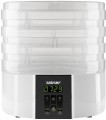Thermostat
The presence of a
thermostat in the dryer — a regulator that allows you to set the temperature in the working chamber. Thus, the temperature regime can be chosen at your discretion — depending on the type of processed products and on the desired degree of drying.
Note that the specific format of this function may be different. The simplest option is a sensor that monitors the temperature in the working chamber and periodically turns on the heating when the air inside begins to cool. Such devices are quite simple and inexpensive. In more advanced dryers, there is another mode: the heater constantly supplies air of a certain temperature to the trays (this temperature is controlled based on data from the temperature sensor). This format is more expensive, but it allows you to provide the most uniform heating and has a positive effect on lifetime of the device.
In turn, the absence of a thermostat means that the dryer has only one operating temperature option. This limits the possibilities accordingly. However, this option also has advantages — simple design, reliability and low cost.
Temperature range
The temperature range that the dryer can provide in the working chamber.
The simplest models provide only one operating temperature option, usually from 50 °C to 60 °C. More advanced devices equipped with thermostats (see above) and can have a wide range of adjustment — this is very useful, because different temperature regimes are recommended for different products. To assess the general capabilities of a particular dryer, you can use the following table of temperatures recommended for drying:
— 35...40 °C — plant stems, greens;
— 40...45 °C — bread;
— 38...42 °C (in some cases up to 45 °C) — yoghurt;
— 50...55 °C — vegetables;
— 55...60 °C — fruits;
— 65...75 °C — meat, fish.
We emphasize that these are the most general, conditional data. The specific temperature may differ from the recommended one — depending on the thickness of the slices, the specific type of food, the desired result, etc. Detailed recommendations on this matter can be found in special sources.
Shutdown timer
A special device that turns off the heating after a predetermined time.
The presence of a
timer greatly simplifies the use of the device: instead of monitoring the duration of the process and manually turning off the heater, it is enough to set the desired turn-off time in the settings. In addition, this function reduces the risk of forgetting about drying products and “overexposing” them in the dryer: this can only happen if the timer was initially set for too long.
Note that the type of timer directly depends on the type of control (see above); at the same time, mechanical timers are simple and inexpensive, but they have a rather noticeable error, and electronic ones are very accurate, but they cost accordingly more.

